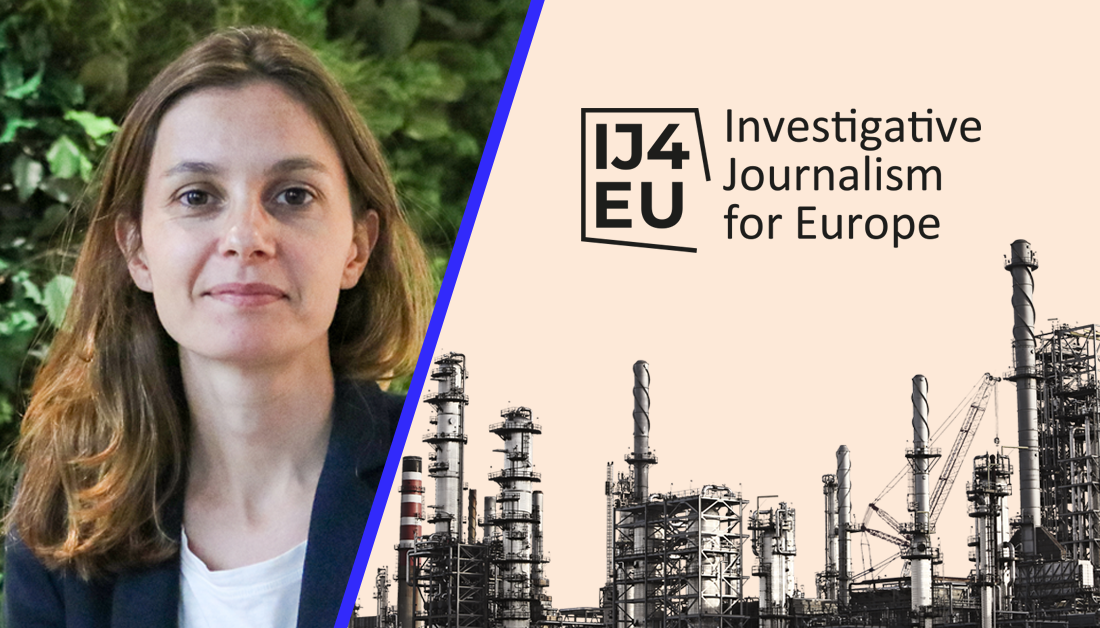IJ4EU grantee Emmanuelle Picaud describes how she and her team uncovered a profiteering scandal in the EU’s carbon market.
By Lauren Beauchamp
In its quest to combat climate change, the European Union has spent three decades trying to incentivise major polluters to reduce their greenhouse gas emissions through a scheme that would reward their cutbacks through the world’s first major carbon market.
Yet an IJ4EU-supported investigation reveals a disheartening truth. While billions of euros have been funnelled into the initiative providing carbon credits to encourage companies to reduce emissions how and where it costs least to do so, much of that money has disappeared into the pockets of company shareholders – quite legally and with no benefit to the environment.
“Our investigation revealed that companies make billions thanks to EU authorities’ largesse on the carbon market,” Emmanuelle Picaud, a French based freelance journalist who led the investigation, told the International Press Institute in an interview.
“They never spent this money to fight against climate change at all, which means that they polluted throughout decades, and they can continue to pollute, too.”
The revelation sparked Picaud’s months-long journey into how cement and steel manufacturers in France and Spain are profiting from the EU Emissions Trading System. The result was Cashing in on Carbon Credits, an investigation supported by IJ4EU’s Freelancer Support Scheme.
‘A failed system’
Introduced in 2005, the EU Emissions Trading System has been decried by some as a “right to pollute.”
It works on a “cap-and-trade” principle, motivating big polluters by offering free emissions allowances that can be sold on the carbon market. These allowances, intended to spur investment in cutting emissions overall, are supposed to reduce over time, as are caps on the amount of greenhouse gases that industries can produce.
But what started as a proactive climate initiative has become a failed system, Picaud said.
“The problem is the estimations of allowances were false because they were made before the economic crisis of 2008,” she added. “Companies have a huge stock of allowances. They sold their allowances just to make profits and were finally never forced to adapt to climate change.”
In other words, the inaccurate estimations allowed companies to carry on pumping out CO2 emissions with little consequence.
Using an open-source database on the EU’s carbon market, the team of freelancers was able to analyse carbon-credit transactions and the companies that made them, proving that big polluters in France and Spain took advantage of the system.
“Two million transactions were registered in the EUETS.info database, which is in fact quite huge,” Picaud said.
Many cement and steel manufacturers still have millions of euros worth in allowances and are waiting for the right moment to trade, according to the investigation. Such financial transactions could yield even more substantial profits for these companies, with no assurances of any subsequent reinvestments in climate-related endeavours.
“Once you sell it on the market, it’s just a basic auction that companies can use as they want after,” Picaud said.
The power of collaborative journalism
Teamwork proved vital for the success of the investigation. Picaud joined forces with Guillaume Delacroix, who brought field expertise, and Luc Martinon, who excelled in data analysis. For Picaud, exchanging investigative techniques with her colleagues was game-changing.
“As a freelancer, team opportunities are rare, but I cherished it,” she said. “Learning from others’ investigative approaches was invaluable.”
Each team member’s distinct personality and journalism style created a dynamic atmosphere, she added. “Diverse skills and viewpoints within a team are essential for a successful investigation, especially in smaller teams.”
‘It means you made a difference’
While the investigation has raised awareness in and among the members of the European Parliament and the audiences of Le Monde and elDiario, which published stories by the team, Picaud is determined to keep the dialogue going.
“It is important to make it public because the fight against climate change is a problem for all of us. Legislators and companies need to tell citizens where their money is going and if the money was put to good use.”
Despite the failures of the EU’s system, the team of investigative freelancers feel gratified by the impact their work has had on the public.
“Some readers told us they are really happy because they didn’t see so many long investigations in the press,” Picaud said. “It is a fact that the media only sometimes have time to make such reports, especially for freelancers. Reading their comments was one of the most grateful moments of the investigation for me. It means that people recognise the work. When a reader says that for your investigation, it means you made a difference.”
For more on this IJ4EU-supported investigation, see Cashing in on Carbon Credits.
